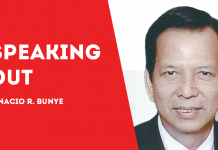
A UNITED Nations Organization (UNO) document defines social inclusion as “a process by which efforts are made to ensure equal opportunities for all, regardless of their background, so that they can achieve their full potential in life”.
I would surmise that one way or the other, these words could also define the meaning of having an exclusive society, or the actions towards that goal.
From an analytical perspective however, I am tempted to ask who should be making these efforts, or whose responsibility it is to make this definition come true. Is it just the government? Or should it include the whole society in general? Or should it be the self-imposed duty of the supposed civil society?
No thanks to some people who acted wrongly in the past, the term “civil society” has a negative connotation now, but the fact remains that the civil society is the aggregate of non-governmental organizations (NGOs) and institutions.
It goes without saying therefore that the civil society is the subset of the broader society, the subset that would tend to be more active in governance, by way of the people who are involved with the NGOs, again one way or the other. By direct implication, it would also mean that in so many cases, many of these NGOs would actually be working towards achieving an exclusive society, again one way or the other.
Going back to the basics, it could be said that providing equal opportunities for all is and should be one of the primary goals of a democratic society. For all intents and purposes, it could be said, or it should be said that each and every democratic society should be an exclusive society and therefore it could further be said that the inclusiveness of a society is clear proof that democracy exists.
Back on the practical realm however, it would not be difficult for us to realize that many if not most of the democratic societies are not really inclusive, not only in terms of politics, but also in terms of economics. Sad to say, poverty exists even in the richest of countries, and that does not show inclusiveness at all.
To put it in very simple terms, inclusion means being included and one simple manifestation of that is to be listed somewhere. Just to cite an extreme example of that, there are many Filipinos who do not even have birth certificates, perhaps thousands of them! Without a birth certificate, these people could not even prove that they are Filipino citizens, because they could not even get a passport, much less a driver’s license.
So much about inclusion if these people are not even included in the most basic of lists. You could call that social exclusion so to speak, but there is that other problem of economic exclusion because there are many Filipinos who do not have a bank account, much less a credit history.
It goes without saying that anyone who does not have a birth certificate and a driver’s license and a passport could not open a bank account, period. Of course you can call that financial exclusion especially so if those who are affected could not even establish a credit rating.
Obviously, that is a classic chicken and the egg situation, because not one could establish a credit rating not unless someone gives them a credit line or a credit card. The fact it, they could not get into the system because they could not borrow, and that is when they become unbanked, so to speak.
In a manner of speaking it could be said that the cycle of poverty continues, because if the poor people could not have access to working capital, they could not do business.
So back to my question, who are going to make the efforts to ensure the equal opportunities?
Perhaps due to the lack of proper definitions, I would rather say that having equal opportunities should mean having equal access to the services and the institutions that would enable people to achieve their full potential.
There are many examples of how this could be manifested, but some obvious examples are having access to justice, education, wellness, employment, livelihood and security, the latter having so many subsets as well.
For these six services, I have created the mnemonic device of “JEWELS”, explaining carefully that wellness in this case would include healthcare as one of its subsets.
In a manner of speaking, it could be said that the government and the national institutions are not really obliged to “give” anything to anybody, except perhaps for access, or equal access so to speak.
Take the case of education for example. It could be said that with a few exceptions, everyone in this country would have equal access to education, setting aside issues of quality.
Assuming that everyone could get educated for as long as they would want to, that would already give them equal access to employment, if in case they would rather be employed than go into business.
I say that we have to set aside issues of quality, because those who have more money could actually get better education./PN







